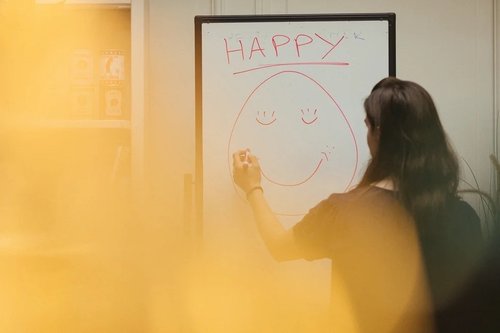From romantic love to corporate passion: When do our work expectations turn toxic?
19 sept 2022
11 min

It’s been roughly a decade since the voices of progressive movements began penetrating the walls of corporations. As a growing number of workers demand that company values align with their own, major brands have been putting out one statement after the other declaring their commitment to community building, diversity, equality, and environmental stewardship.
But while the wave of corporate responsibility may have granted workers more power, some experts point to the limitations of private companies as vehicles for political and social change.
Can corporate values and employee activism replace political action? To what extent can a workplace fulfill the human need for purpose and meaning? And do we really need a higher purpose at work?
These are some of the topics we discuss with Alison Taylor, Welcome to the Jungle’s ethics expert from the The Lab. Taylor is executive director of Ethical Systems, a US think tank and research center that builds bridges between academia and the business world. She teaches professional responsibility and leadership at NYU Stern School of Business.
Younger peoples’ heightened expectations of work have earned us the designation Gen. Dreamer. As a teacher at NYU, do you think that’s an accurate description?
I teach at a business school, which obviously attracts a particular kind of young person. But my experience, both on the undergraduate level and in the MBA classes, is that there is quite a binary divide over values at work. For example, I often ask my MBA students whether they’d work for Amazon — and that question sharply divides the classroom: half the students will say, ‘no, Bezos is a crook, and Amazon has a toxic corporate culture,’ while the other half will say ‘yes, it’s an innovative, amazing company.’
Similarly, in the undergraduate classes, some students aim to become analysts at Goldman Sachs or Morgan Stanley, where work is famously brutal with 100-hour workweeks. But they’re prepared to do that today so they can later land the swank job in private equity and become incredibly rich. So half the students reason along those lines: I’ll put up with this now and pay off my student debt — it sucks, but it’s just what you got to do — and on the other side, you get the students who’d never even consider that type of work, and want something entirely different from their career.
For the students who do expect something more from work than just a paycheck, what do see as the positives and potential pitfalls?
When I think about my twenties, I had this idea that once you get a proper job, you need to go to the Banana Republic and buy horrible clothes and go sit in an office and be treated very badly. In other words, you need to put in the time and do whatever your boss says until you have enough seniority to boss other people about. That was literally my view of work. And so I think that, on the one hand, it’s incredibly healthy that young people don’t think like that anymore, and rather feel that if I’m going to dedicate all this time, it needs to be on something I believe in.
“ You need to put in the time and do whatever your boss says until you have enough seniority to boss other people about. That was literally my view of work.”
But on the other hand, I question the feasibility of never compromising. There are all these surveys pointing to young people wanting to work somewhere where the company values align with their own, and they’re not prepared to bargain. But the notion that you can go work for a for-profit company and your work will always be 100% in line with your personal values seems wildly unrealistic.
“The notion that you can go work for a for-profit company and your work will always be 100% in line with your personal values seems wildly unrealistic.”
Beyond potential disappointment, are there other dangers in blurring the lines between our personal beliefs and corporate policy?
So corporations are obviously fragile these days: suddenly they need to not only be something but to mean something, and a lot of their efforts to project this meaning are marketing-led. For example, if you read a purpose statement from Coca-Cola or Facebook, you’ll find the most grandiose, unrealistic visions: Facebook says something like, we’re going to “build community and bring the world closer together,” and Coca-Cola says, we’re going to “inspire moments of optimism and happiness.” The message — that we supply some sense of elevated meaning to workers and consumers — is fascinating, coming from a social media platform and a company making sugary drinks.
But I don’t think we as human beings necessarily need a grandiose ‘higher purpose’ in what we do. You need a culture where you’re treated with dignity and respect, feel your work is valued and that you’re making a contribution. Meanwhile, a lot of corporations are looking for the branding upside of purpose, without dealing with those fundamentals.
“You need a culture where you’re treated with dignity and respect, feel your work is valued and that you’re making a contribution.”
I believe that’s what partly drives the Great Resignation: the grandiose corporate rhetoric and its reality gap — where companies now suggest they’re going to lead with their values. But are you really feeling those higher values during your work in the billing department, or is it perhaps more important to have good relationships and freedom? In that sense, talking about a higher purpose can be deceptive and deflect from the real questions we should be asking about workplace culture.
“Talking about a higher purpose can be deceptive and deflect from the real questions we should be asking about workplace culture.”
Another issue when workplaces become these repositories of values is that it opens the door to exploitation. If work becomes all-encompassing and embodies our highest values, then it’s obvious that employees will become more dedicated and willing to work longer hours for less money.
Let’s consider that, already in the 1960s, there were all these predictions that we wouldn’t be working more than 10 hours a week by now — but we’re all working harder than ever. To me, much of this seems to be driven by a late-stage capitalistic model; in other words, it’s merely a new kind of iteration of fooling us into thinking that if we work all the hours God sends our way and put our hearts into it, work will love us back.
But most of the time, work won’t love us back — it will write us off as soon as there’s not enough money to go around.
Do you see our yearning for meaningful professional lives as isolated to work, or is it part of a broader generational trend?
In a sense, our expectations of work have traveled in tandem with our view of romantic love. In the 19th century, marriage was essentially a necessity where you needed a partner in order to both till the fields and bring up children. However, as you were part of a community, you didn’t necessarily expect your husband or wife to fulfill all of your spiritual, sexual, emotional, and intellectual needs all at once.
“Our expectations of work have traveled in tandem with our view of romantic love.”
Today, we seem to have collectively landed on the idea that all of those needs should indeed be fulfilled by a romantic partner. But I think those expectations are unrealistic, and I’d say the same thing about believing our jobs will provide the same fulfillment — it’s setting ourselves up for disappointment.
Part of the pivot to corporate purpose — to use a very corporate phrasing — is a new view of the meaning of leadership. Mostly, it seems to be centered around non-hiearchical organization. Do you think that, as often touted, it’s a silver bullet to workplace injustice?
When I talk to my undergraduate students about business ethics and leadership, many will argue that as everything will soon be based on crypto and DAOs, these new, democratic models of organization will cancel out the need for such discussions. But I’m not so sure.
The problem with these holacratic, hyper-transparent models — where no one is in charge, and everything is decentralized — is that they tend to go toxic. The reason is the false idea that bullying, politics, and power dynamics all disappear just because we say they don’t exist. For example, Goldman Sachs just announced a policy of unlimited vacation. While that’s largely been hailed as some democratization of leisure time, I don’t think this accounts for how politics, power, and perception actually work.
“The problem with these holacratic, hyper-transparent models — where no one is in charge, and everything is decentralized — is that they tend to go toxic.”
We’re also seeing a lot of worker activism in the US, perhaps big tech and the restaurant industry being the most prominent examples. Are these efforts also fueled by our quest for purpose?
We’re definitely seeing a revival of interest in power dynamics at work. American unions, for example, remain weak, but there are indicators that they’re re-establishing a foothold. Returning to my students, they are certainly more pro-union than you would expect from undergraduates at a business school. When I was young, terms like ‘unions’ and ‘worker power’ sounded really socialist and outdated, but a lot of that is coming back.
A big part of that shift in power dynamics — where workers now have much more influence over corporate policy and leadership overall — is due to employees’ ability to leak damaging information, an obvious example being the Facebook whistleblower.
But I also think that the increased corporate activism in the US has something to do with disillusionment with politics. Especially among young people, there is that feeling that either you can wait four years to cast your ballot in a gerrymandered system where your vote won’t make any difference. Or, you can pressure your employer to change the company policies or boycott a brand — and it’s far more likely your efforts will have an effect. So I think we’ve pushed a lot of our political frustrations onto the realm of private companies.
Speaking about politics, it seems to me that while we’re trying to democratize the workplace, politics — both in Europe and the US – is tending towards authoritarianism and a renewed affection for strongmen…
It’s interesting you mention strongmen. There’s certainly something to the notion that we turn towards authoritarianism during pandemics, extreme disruption, and in times of chaos. But on a corporate level, I see this mixed messaging about leadership. For example, there are studies showing that job descriptions have changed dramatically over the last 15 years: rather than looking for someone who can bark orders from above, companies want leaders with emotional intelligence, network-building skills, and empathy — you know, all the things that would prioritize more female leadership.
But at the same time, we continue to adore leaders like Elon Musk. You’re probably familiar with the classical metaphor: if a corporation was a person, it’d be a psychopath. But while — true — sociopathic leaders get promoted more often, it seems to me that we’ve now swapped sociopathy for schizophrenia. Now, we want a set of qualities that simply don’t exist in one and the same leader — we still want that authoritarian strongman, but we also want that kind of paternalistic comfort.
“It seems to me that we’ve now swapped sociopathy for schizophrenia.”
So far we’ve been talking about the US, but coming from the UK, do you think that the focus on corporate values and new types of leadership are strictly American tendencies?
I do think you see much of the same focus on diversity, inclusion, and social responsibility in the U.K. However, in the UK, the topic of class is still really pervasive, and to some extent, it makes sense. For example, lots of the people I went to college with are now running the country, the media, and big business — it’s a tiny little cabal of people from a certain background and a certain class.
Americans, however, don’t like to talk about class. Rather, the national ethos is that if you work hard you can make it. And I do believe the American economy is much more dynamic, just like the political system is more dynamic: I’ve had a lot of opportunities here that I wouldn’t have had in the U.K.
At the same time, the backside of that dynamism — and the problematic myths about money and meritocracy — is that it can be used to justify a lack of social services, systemic racism, and poor healthcare. I mean, the fact that your healthcare is tied to your job is, from my European viewpoint, the most insane thing ever.
“The problematic myths about money and meritocracy — is that it can be used to justify a lack of social services, systemic racism, and poor healthcare.”
And this is reflected in the veneration of people like Musk. Another example: The CEO of Snapchat recently wrote off the student debt of graduates at a Los Angeles design school. Over here in the US, that’s been presented as this very heartwarming situation. But I find it depressing that we’re forced to rely on billionaire philanthropy. Sure, those students got their debt written off, but what about all the other students? Are we supposed to rely on Bezos, Musk, and Zuckerberg to bail us out of what our social services and politicians won’t do? It’s a huge problem, not least because we’re giving these individuals enormous influence over things like education and healthcare.
“Are we supposed to rely on Bezos, Musk, and Zuckerberg to bail us out of what our social services and politicians won’t do? [W]e’re giving these individuals enormous influence over things like education and healthcare.”
To summarize, it sounds like you see potential for good in some of the ongoing changes, but worry about the scope-creep of our trust in the private sphere?
The fact that corporate brand image has become paramount has granted employees the ability to weaponize reputational damage. And so we’re experiencing a real bottom-up push where workers are finding their voice and using that to enable more democratic decision-making. Essentially, if the company isn’t taking the right stands on issues like abortion, gun control, immigration, or climate change, we’re going to go out or leak damaging information to apply pressure. Now that power shift — where leaders can’t control the culture and corporate narrative anymore — is completely new in the last decade.
There are also other shifts, like the prospects of a four-day workweek. It’s been tried in a variety of places — I believe that includes Scandinavia — and it seems it doesn’t negatively affect productivity. So I see that as something very positive.
However, we should also remember that a private sector organization is still a private sector organization. As soon as we start believing that a for-profit workplace will provide us with spiritual fulfillment and work becomes ubiquitous in our lives, we’re actually allowing ourselves to be exploited.
“As soon as we start believing that a for-profit workplace will provide us with spiritual fulfillment and work becomes ubiquitous in our lives, we’re actually allowing ourselves to be exploited.”
My point is that we need a reality check regarding what can actually be achieved on a private-corporate level, because — as I’ve mentioned before — I believe a lot of the focus on work has to do with political dysfunction and frustration.
A few weeks ago, I listened to this guest speaker at a sustainability course. He played video footage of a lot of 19-year-olds declaring how concerned they were about racism, abortion rights, climate change — and how worried they were about their future. He then goes on to suggest that, what young people really need is a deeper connection — a deep personal connection — to brands with meaning.
Now, I see all the things he mentions as very real, serious problems, but I don’t see how having a close relationship to corporate brands is going to solve what are essentially political and societal problems. To me, it’s a distraction. That might especially be true for young people who then believe that corporate social responsibility can somehow replace political action.
“I don’t see how having a close relationship to corporate brands is going to solve what are essentially political and societal problems.”
Everybody seems to be saying, ‘well, businesses have to stand up and say something’ about this or that issue. But what’s it really going to do if Coca-Cola stands up for abortion rights? Nothing good. It’s just going to be an even worse Republican backlash and make the polarization worse. So I come back to this idea that we can’t rely on the private sector — it was never designed to solve our political issues, all while ‘leading with their values’ and giving us the spiritual fulfillment we all want.
I think what we truly need is a recalibration of the relationship between business and politics, and part of that is putting work back into its box.
Photo: Welcome to the Jungle
Follow Welcome to the Jungle on Facebook on LinkedIn and on Instagram and subscribe to our newsletter to get our latest articles every day!

Más inspiración: Alison Taylor
Executive Director, Ethical Systems

Can you be ethical in an unethical business organization?
Ethics Washing is when corporations promise the moon but never deliver on their ethical commitments. Alison Taylor, our expert on ethics, explains.
04 abr 2022

Business ethics: how to do the right thing in a turbulent world
Alison Taylor's background is one of the reasons she talks about ethics in a way that makes sense to non-specialists. Here’s what we asked.
09 mar 2022

Advice for people pleasers: Breaking free from being “too nice” at work
Do you often say things like, "Yeah, sure, I can do that!" when in fact you don't have the bandwidth to do that? We've got you.
12 dic 2024

There’s no place like home: Does relocation hurt productivity?
Relocating often brings homesickness, but it’s part of the journey. Here’s how to embrace the change and make the most of it.
22 oct 2024

Should you take your office crush to the next level?
Is an office crush worth the risk, or more damaging to your career and reputation than you think?
09 oct 2024

¿Estás buscando tu próxima oportunidad laboral?
Más de 200.000 candidatos han encontrado trabajo en Welcome to the Jungle
Explorar ofertas

